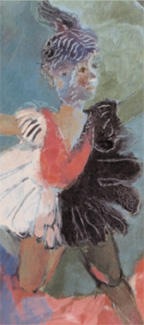| GLOBE
AND MAIL
Saturday,
February 1, 2003
Why
The Call It High Blood Pressure
by Gabor Maté
Many
CBC listeners were chagrined to learn last week that radio
personality Shelagh Rogers is taking a break from her
national morning program, Sounds Like Canada. Although
Ms. Rogers is rumoured to be exhausted from hassles with
CBC management, the ebullient radio host insisted, "It
is not a stress leave. It is because I have high blood
pressure."
Ms. Rogers may be excused for making that false distinction.
In keeping with the mind/body split endemic in Western
culture, the medical profession itself fails to recognize
-- despite ample research evidence -- the connection between
the stresses of modern life and elevated blood pressure.
Insufficient attention is paid to stress reduction as
a way of treating high blood pressure.
Hypertension, the medical term for high blood pressure,
is a major risk factor for strokes and heart disease.
Its successful treatment has demonstrable health benefits
and is a multibillion-dollar source of revenue for the
drug industry. Research dollars, predictably, go to projects
that focus on pharmaceutical approaches.
Blood pressure is a measurement of the pressure in the
arteries, the vessels that conduct blood from the heart
to the other organs. "The cause of elevated arterial
pressure is unknown in most cases," a widely respected
medical textbook states. It is a case of the lay public
being ahead of the professionals, since many people will
remark when they are upset that "I'm sure my blood
pressure is sky-high." Physiologically, they are
entirely correct.
The narrower the arteries, the greater the resistance
to blood flow. Emotional upset triggers the release of
adrenaline and activates the sympathetic nerves, the flight-or-fight
component of our nervous system. Muscles throughout the
body tighten, including in the walls of arteries. Resistance
to flow increases, as does the blood pressure.
Voluminous research documents the hypertensive effect
of stressful situations, including job stress. In British
studies, individuals who perceived themselves to be under
high job strain were shown to have higher blood pressure
on work days than on non-work days. In another study,
blood pressure was elevated in response to tasks that
were imposed on the subjects and which, therefore, they
could not control. By contrast, self-chosen, controllable
tasks had no such effect.
Such findings are consistent with what is known about
stress: Stress is characterized by a loss of control,
lack of information, uncertainty and conflict, all features
of contemporary social life. Urbanization increases the
risk for hypertension.
A common, but hidden, source of stress are emotions a
person may not even be aware of -- or, if aware, unable
to express effectively. The chief of these is anger. Both
the unrestrained expression of anger and its suppression
are significant contributors to high blood pressure and
heart disease. The sympathetic nerves triggered in rage
reactions narrow the blood vessels, inducing hypertension
and reducing oxygen supply to the heart. The stress hormones
secreted during rage states raise cholesterol levels and
heighten the risk of blockages in the arteries.
"It was blind rage, I was sure, that had gotten me
into this fix with my heart," U.S. journalist Lance
Morrow wrote in Heart, his memoir of cardiac disease.
The other side of the coin is that people who repress
their anger also increase the resistance in their arteries
and thus their risk of hypertension.
With high blood pressure, as with many other phenomena,
our language tells us more than sometimes we are prepared
to understand. Is it purely accidental that the word "pressure"
can refer to a feeling and also to a hydrodynamic state
of our blood vessels? Or that "tension" describes
both what we experience emotionally and a physical state
in our cardiovascular system?
About two months ago, I had a routine check and learned,
to my surprise, that my blood pressure -- usually in the
normal range -- was markedly elevated. The first question
my family physician, a doctor aware of psycho-emotional
factors in health and illness, asked me was whether I
was stressed. "No, of course not," I replied
automatically. My response was typical. Most of us live
our lives as if nature had intended us to spend our days
running on treadmills, without a thought for our emotional
and spiritual rest and well-being. But further reflection
led me to make changes. Within a few weeks, the blood
pressure was back to normal.
A recent Canadian medical journal article on the treatment
of high blood pressure advises physicians to take into
account such lifestyle factors as excessive alcohol intake,
obesity, lack of exercise, too much dietary salt and excessive
licorice intake. Sensible advice, but notable in its omission
of social and emotional stress. Healthy blood pressure
control requires a recognition of the stresses acting
on us, a clear sense of when we are upset and an effective
way of expressing and resolving anger.
BACK |
Now comes Gabor Maté , an
insightful, no-nonsense, and thoroughly compassionate
physician who provides an overview of all these perspectives
and comes to the marvelously humane conclusion that ADD/ADHD
is neither nature (genetics) nor nurture (parenting/environment)
but, rather, the result of the collision of a predisposing
nature with an ADD-hostile life situation, family, school,
or job. How refreshing!
-Thom
Hartman, author of ADD: A Different Perception and many
other books about ADD |


